unit7[上学期]
图片预览

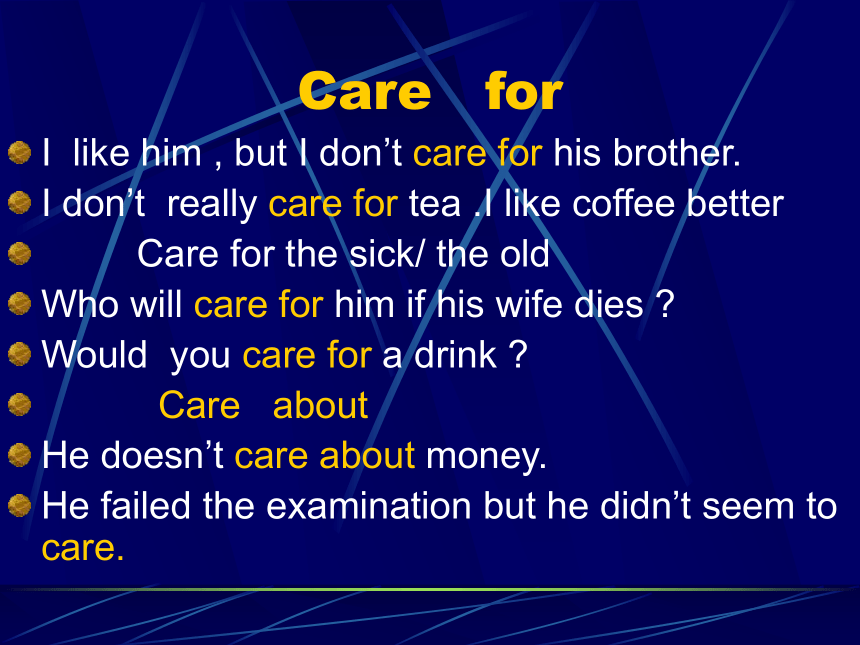
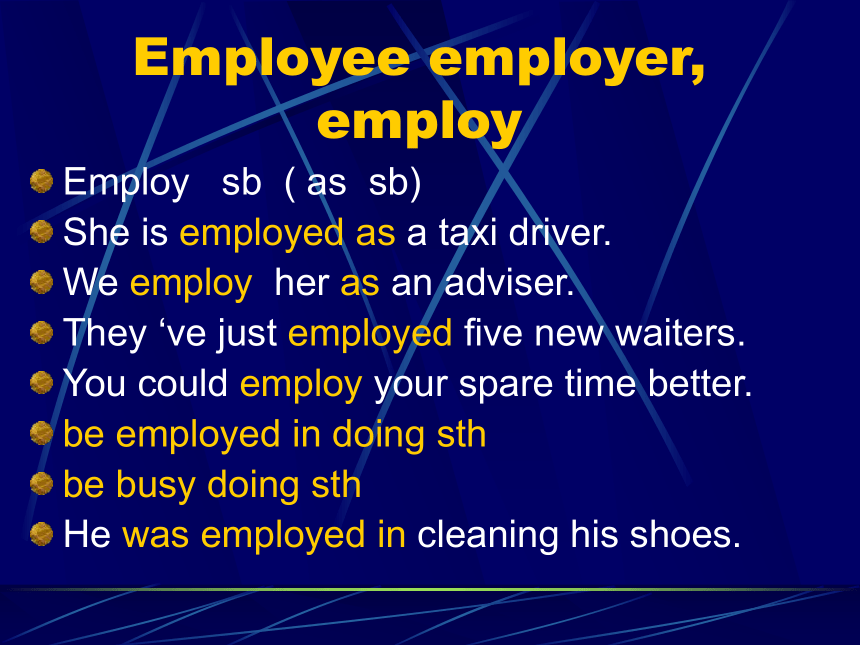
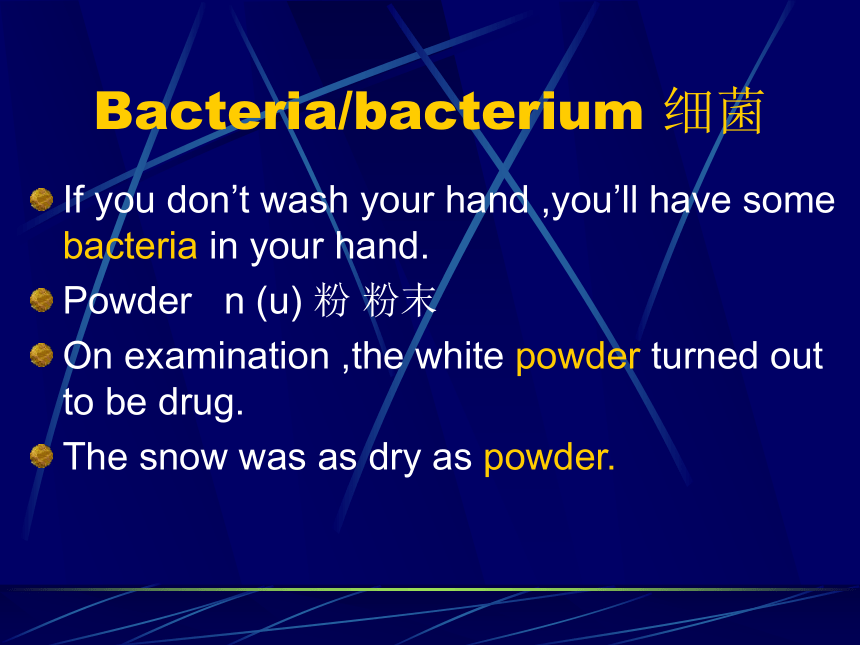
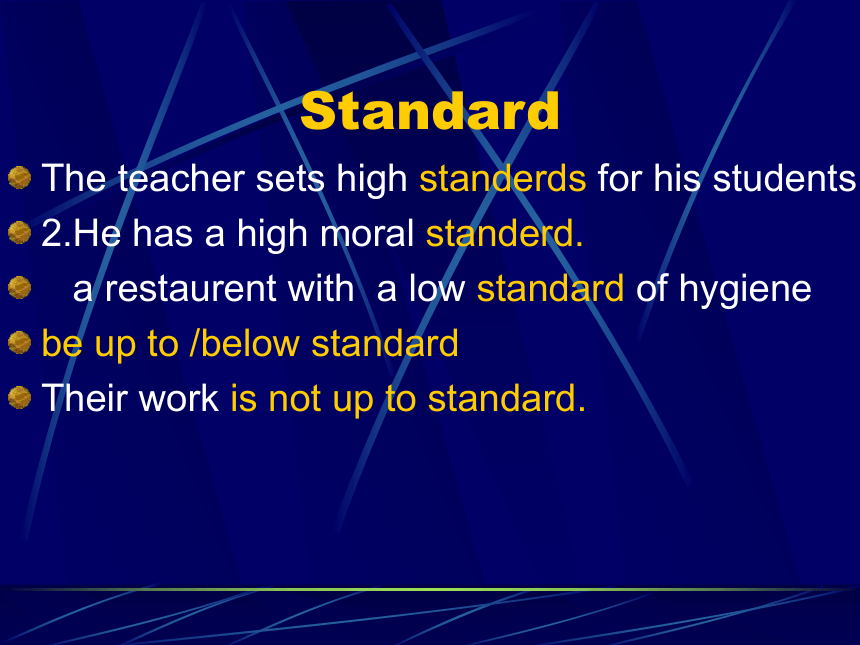
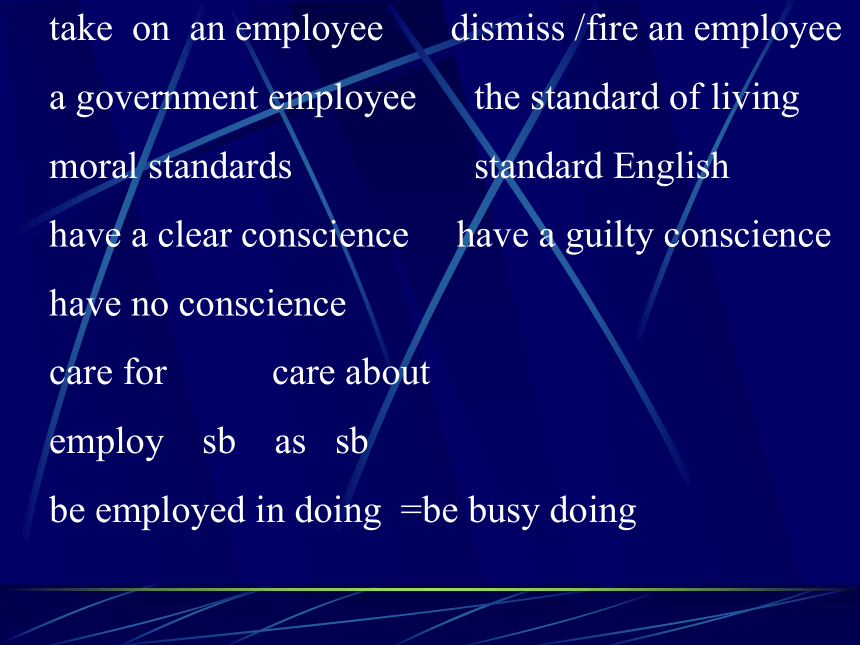
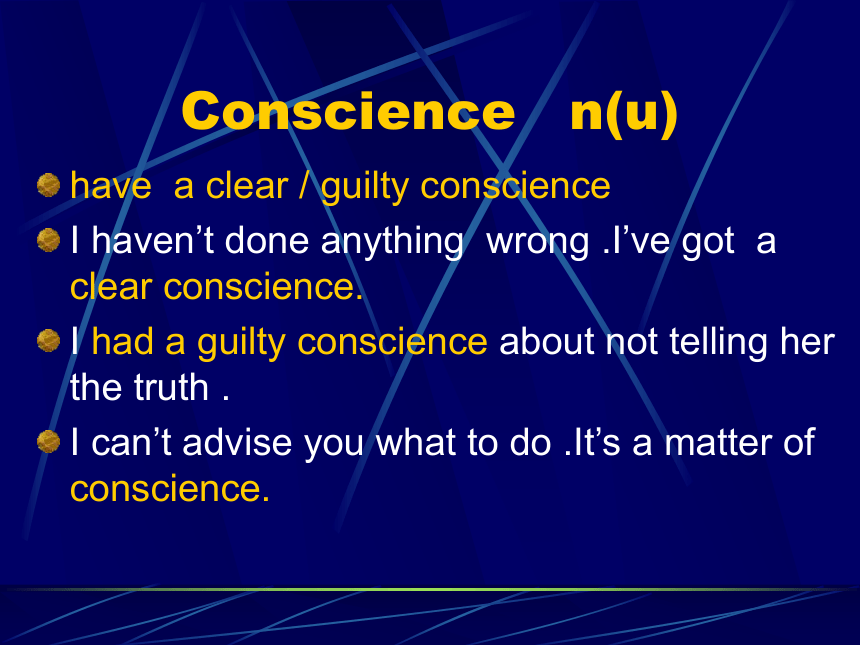
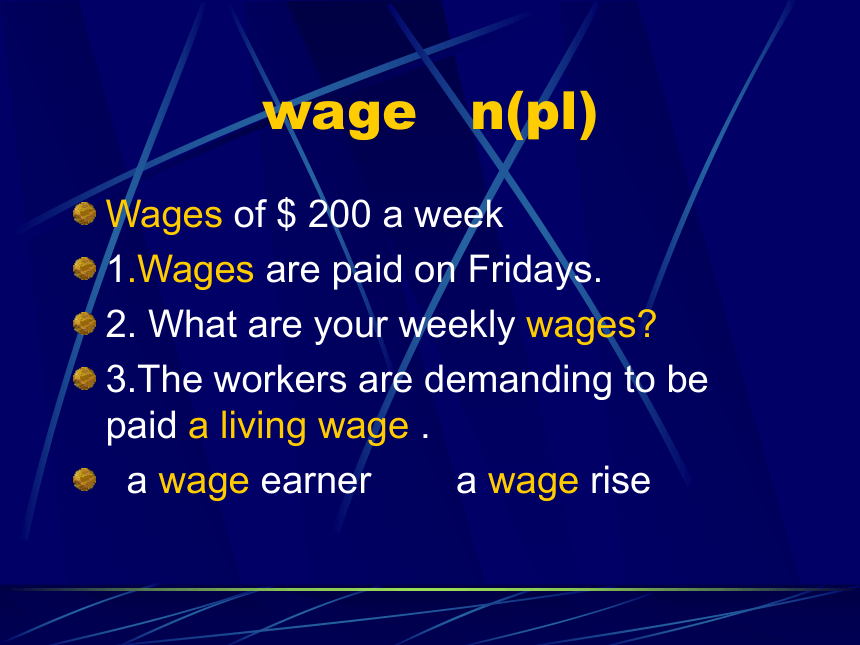
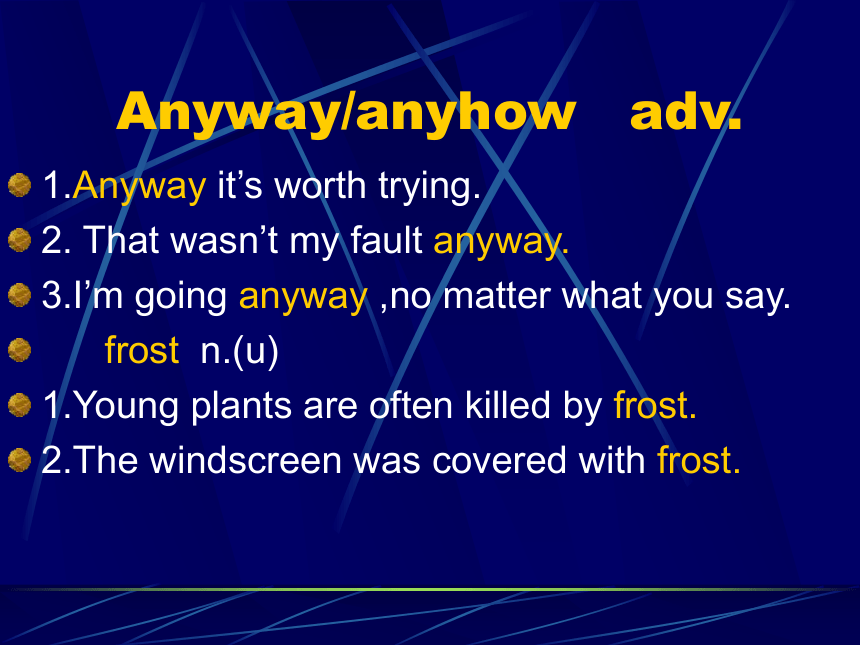
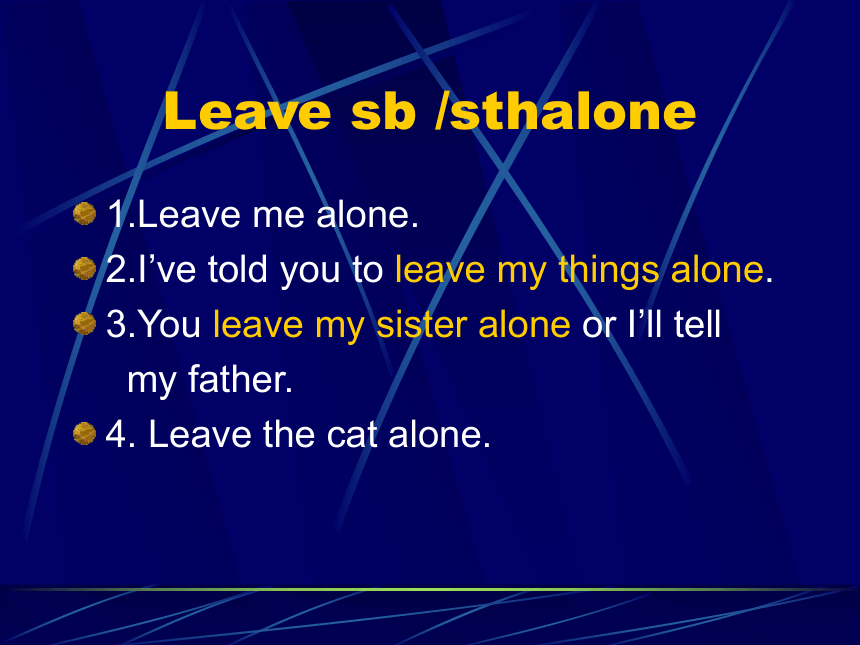
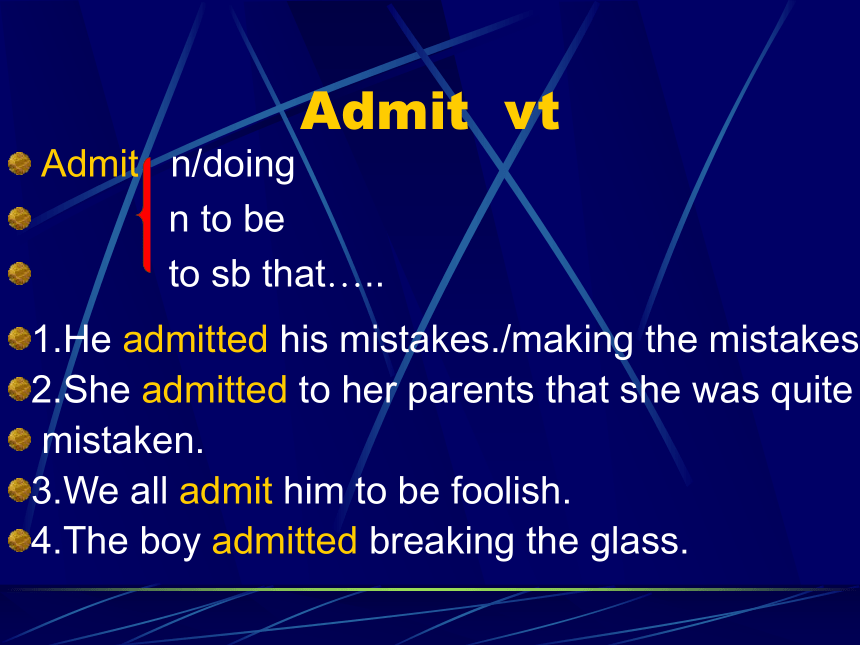
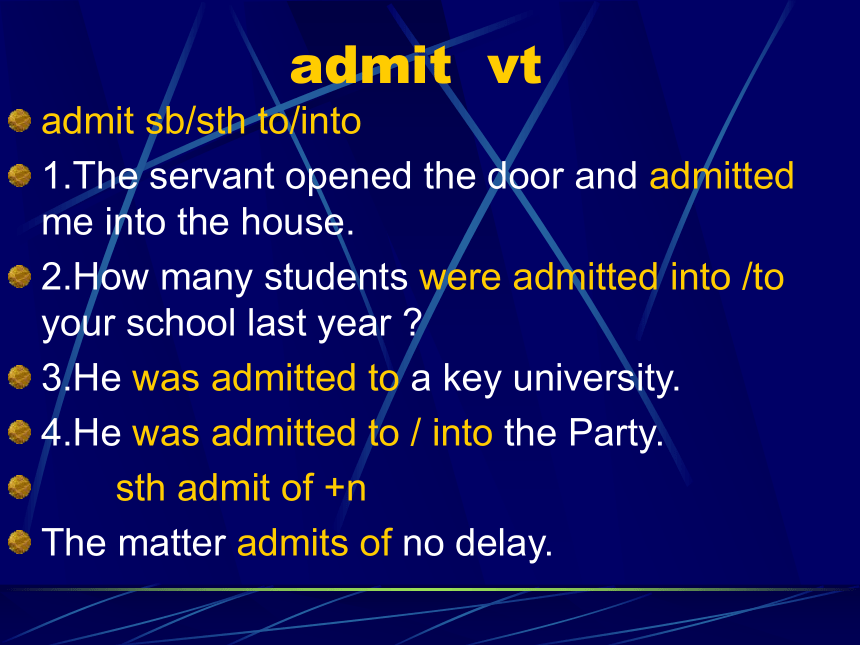
文档简介
课件41张PPT。unit7Care for I like him , but I don’t care for his brother.
I don’t really care for tea .I like coffee better
Care for the sick/ the old
Who will care for him if his wife dies ?
Would you care for a drink ?
Care about
He doesn’t care about money.
He failed the examination but he didn’t seem to care.
Employee employer, employEmploy sb ( as sb)
She is employed as a taxi driver.
We employ her as an adviser.
They ‘ve just employed five new waiters.
You could employ your spare time better.
be employed in doing sth
be busy doing sth
He was employed in cleaning his shoes.
Bacteria/bacterium 细菌If you don’t wash your hand ,you’ll have some bacteria in your hand.
Powder n (u) 粉 粉末
On examination ,the white powder turned out to be drug.
The snow was as dry as powder.
Standard The teacher sets high standerds for his students.
2.He has a high moral standerd.
a restaurent with a low standard of hygiene
be up to /below standard
Their work is not up to standard. take on an employee dismiss /fire an employee
a government employee the standard of living
moral standards standard English
have a clear conscience have a guilty conscience
have no conscience
care for care about
employ sb as sb
be employed in doing =be busy doingConscience n(u) have a clear / guilty conscience
I haven’t done anything wrong .I’ve got a clear conscience.
I had a guilty conscience about not telling her the truth .
I can’t advise you what to do .It’s a matter of conscience.wage n(pl)Wages of $ 200 a week
1.Wages are paid on Fridays.
2. What are your weekly wages?
3.The workers are demanding to be paid a living wage .
a wage earner a wage rise
Anyway/anyhow adv.1.Anyway it’s worth trying.
2. That wasn’t my fault anyway.
3.I’m going anyway ,no matter what you say.
frost n.(u)
1.Young plants are often killed by frost.
2.The windscreen was covered with frost.Leave sb /sthalone1.Leave me alone.
2.I’ve told you to leave my things alone.
3.You leave my sister alone or I’ll tell
my father.
4. Leave the cat alone.Admit vtAdmit n/doing
n to be
to sb that…..1.He admitted his mistakes./making the mistakes.
2.She admitted to her parents that she was quite
mistaken.
3.We all admit him to be foolish.
4.The boy admitted breaking the glass.
admit vtadmit sb/sth to/into
1.The servant opened the door and admitted me into the house.
2.How many students were admitted into /to your school last year ?
3.He was admitted to a key university.
4.He was admitted to / into the Party.
sth admit of +n
The matter admits of no delay.festive adj 欢乐的 宴会的 节日的 a festive season
festivel n 节日
Christmas and Easter are Church FesativelsClap vi 拍手 vt 为 鼓掌, 拍When the performance finished, the audience clapped for a while.
The teacher clapped his hands to make the pupiles quiet.
He clapped me on the back.
。 Abundant adj 丰富的 充裕的The country has abundant supplies of oil and gas。
We had an abundant year last year.
abundance n (u)
We live in abundance.
We enjoy an abundance.
in want of =in need of 需要The house is in want of repair.
He is in want of exercise.
translation1.His wages are $50 a week.
2.The house was empty and I couldn’t get in anyway.
3.He admitted to his teacher that he was quite mistaken.
4. He admitted taking the book away.
5.Only one hundred boys are admitted to the school every year.
6.The path was so narrow that it hardly admitted of two persons walking side by side.
7.leave the box alone.
8.When the boy finished his song. His classmates clapped for five minutes.
idle adj 闲散的 空闲的1.Many people were idle during the depression.
2.We spent many idle hours just sitting in the sun.
3.Owing to the electricity strike, a lot of woekers were left idle. be badly off潦倒,穷困1 He is quite badly off recently.
2.My parents were badly off wjen we were young.
3.She was quite badly off for a while after her husband died.
be well off
1.We are better off now than ten years ago.
2.The government says that people are better
off now than they have ever been. be badly off for 缺少,需要 be in want of be in need of1.The school was badly off for teachers.
2.The factory is badly off for technical people.
3.The school is badly off for desks and chairs.Occupy vt从事,忙于 occupy oneself with sth 从事,忙于
in doing sth1.He occupied himself with some work.
2.She occupied himself in collecting stamps.
be occupied with sth 从事 ,忙于
in doing sth
1.Workers were occupied in pulling down the house.
2.He is occupied in repairing some machines.
occupy vt 占有, 占领,侵占某地1.The dinner and speeches occupied three hours.
2.He occupied the house.
3.The enemy soon occupied the country. constant adj 经常的,不断的 constant arguments
constant complaints
constant trouble
constantly adv
She is constantly changing her mind. close up关闭(暂时),使靠近1.They closed up the shop for lunch.
2.Close up the ranks !
3.The cut on your arm will soon close up.
close down 关闭
1. The little shop on the corner has closed down.
2. He has closed down his business in shanghai. welfare n(u) 福利 child welfare infant welfare
the Welfare State
We work for the welfare of the nation. striking adj引人注意的,引吸 a very striking woman
a striking story
strike vt
1.She struck him with her hand.
2.The clock has just struck six.
be struck by
1.I was struck by her suggestion.
2.I was struck by her beauty. have an eye/eyes for 有眼力,有眼光 ,看重1.He has an eye /eyes for paintings.
2.She has an eye for beauty.
3.He only has eyes for maney.
have no eye for
1.The boss had no eye for his employees demands and needs.
2.I have no eye for classic music. as follows用以列举事项1.The rule is as follows .
The rules are as follows.2. The full text reads as follows.
ambition n (u)雄心,志向野心A boy who is filled with ambition usually works hard.
ambtion to do sth
for sth1.His ambition to become mayor is likely to be relized.
2.The boy had the ambition for a glorious career.
1.关心年轻一代
care for the younger generation
2入党
be admitted to the Party
3从事园艺
be occupied with the garden
4有野心的人
a man of ambition
5充满野心
be full of ambition
6更好地利用时间
occupy the time better
7占领那个国家
occupy the country
8不断的争论
constant arguments
9对于画有鉴赏力
have an eye for painting
10仅看中钱
only have eyes for money shadow n (c) 影子 shade n (u)荫凉1.The earth ‘s shadow sometimes falls on the moon.
2.The weather is hot . We often have to sit in the shade of the tree. noble adj 高尚的,高贵的 a noble mind a noble feelings
a noble man a noble family
It was very noble of you to look after your old neighbour when she was sick .bond n.(c) 契约,债券
enter into a bond with sb 与某人订立契约
I entered into a bond with the company where
I would work in three years.
national savings bonds 国家储蓄债券
government bonds 公债 of late =recently近来 lately( 疑,否 )1.I’ve been rather ill of late /recently.
2.I haven’t seen him lately /of late.
3.The days have been getting cold of late/recently.indeed adv的确,实在地
He is indeed a man of great talent.
Thank you very much indeed.
I may indeed be wrong.
Indeed he is poor but he is happy.selfish adj. 自私的,不顾及他人的
He is a selfish person.
a selfish deed
Don’t be selfish.
Fill in blanks
1.Because of TV , many cinemas have had to _____.
A. close up B. close down C. close
2.Keep in the ____; it’s a cooler.
A. shade B. shadow
3.The young people like popular songs , so they
______the pop songs.
A. have an eye for B. have no eye forBAA4.They don’t seem to be ______----they have beautiful clothes and a nice house.
A.well off B.badly off for C. badly off
5.They are mainly occupied ______ agriculture.
A. in B. on C. withCC1.他们正在建一座桥。
They were occupied in building a bridge.
2.在那些年里,他们比我们更穷.
They were worse off than us those years.
3.无论如何,我今天必须结束这个工作。
Anyway I must finish this work today.
4.我们认为我们应该更好地利用业余时间.
We think we should occupy our spare time better.
I don’t really care for tea .I like coffee better
Care for the sick/ the old
Who will care for him if his wife dies ?
Would you care for a drink ?
Care about
He doesn’t care about money.
He failed the examination but he didn’t seem to care.
Employee employer, employEmploy sb ( as sb)
She is employed as a taxi driver.
We employ her as an adviser.
They ‘ve just employed five new waiters.
You could employ your spare time better.
be employed in doing sth
be busy doing sth
He was employed in cleaning his shoes.
Bacteria/bacterium 细菌If you don’t wash your hand ,you’ll have some bacteria in your hand.
Powder n (u) 粉 粉末
On examination ,the white powder turned out to be drug.
The snow was as dry as powder.
Standard The teacher sets high standerds for his students.
2.He has a high moral standerd.
a restaurent with a low standard of hygiene
be up to /below standard
Their work is not up to standard. take on an employee dismiss /fire an employee
a government employee the standard of living
moral standards standard English
have a clear conscience have a guilty conscience
have no conscience
care for care about
employ sb as sb
be employed in doing =be busy doingConscience n(u) have a clear / guilty conscience
I haven’t done anything wrong .I’ve got a clear conscience.
I had a guilty conscience about not telling her the truth .
I can’t advise you what to do .It’s a matter of conscience.wage n(pl)Wages of $ 200 a week
1.Wages are paid on Fridays.
2. What are your weekly wages?
3.The workers are demanding to be paid a living wage .
a wage earner a wage rise
Anyway/anyhow adv.1.Anyway it’s worth trying.
2. That wasn’t my fault anyway.
3.I’m going anyway ,no matter what you say.
frost n.(u)
1.Young plants are often killed by frost.
2.The windscreen was covered with frost.Leave sb /sthalone1.Leave me alone.
2.I’ve told you to leave my things alone.
3.You leave my sister alone or I’ll tell
my father.
4. Leave the cat alone.Admit vtAdmit n/doing
n to be
to sb that…..1.He admitted his mistakes./making the mistakes.
2.She admitted to her parents that she was quite
mistaken.
3.We all admit him to be foolish.
4.The boy admitted breaking the glass.
admit vtadmit sb/sth to/into
1.The servant opened the door and admitted me into the house.
2.How many students were admitted into /to your school last year ?
3.He was admitted to a key university.
4.He was admitted to / into the Party.
sth admit of +n
The matter admits of no delay.festive adj 欢乐的 宴会的 节日的 a festive season
festivel n 节日
Christmas and Easter are Church FesativelsClap vi 拍手 vt 为 鼓掌, 拍When the performance finished, the audience clapped for a while.
The teacher clapped his hands to make the pupiles quiet.
He clapped me on the back.
。 Abundant adj 丰富的 充裕的The country has abundant supplies of oil and gas。
We had an abundant year last year.
abundance n (u)
We live in abundance.
We enjoy an abundance.
in want of =in need of 需要The house is in want of repair.
He is in want of exercise.
translation1.His wages are $50 a week.
2.The house was empty and I couldn’t get in anyway.
3.He admitted to his teacher that he was quite mistaken.
4. He admitted taking the book away.
5.Only one hundred boys are admitted to the school every year.
6.The path was so narrow that it hardly admitted of two persons walking side by side.
7.leave the box alone.
8.When the boy finished his song. His classmates clapped for five minutes.
idle adj 闲散的 空闲的1.Many people were idle during the depression.
2.We spent many idle hours just sitting in the sun.
3.Owing to the electricity strike, a lot of woekers were left idle. be badly off潦倒,穷困1 He is quite badly off recently.
2.My parents were badly off wjen we were young.
3.She was quite badly off for a while after her husband died.
be well off
1.We are better off now than ten years ago.
2.The government says that people are better
off now than they have ever been. be badly off for 缺少,需要 be in want of be in need of1.The school was badly off for teachers.
2.The factory is badly off for technical people.
3.The school is badly off for desks and chairs.Occupy vt从事,忙于 occupy oneself with sth 从事,忙于
in doing sth1.He occupied himself with some work.
2.She occupied himself in collecting stamps.
be occupied with sth 从事 ,忙于
in doing sth
1.Workers were occupied in pulling down the house.
2.He is occupied in repairing some machines.
occupy vt 占有, 占领,侵占某地1.The dinner and speeches occupied three hours.
2.He occupied the house.
3.The enemy soon occupied the country. constant adj 经常的,不断的 constant arguments
constant complaints
constant trouble
constantly adv
She is constantly changing her mind. close up关闭(暂时),使靠近1.They closed up the shop for lunch.
2.Close up the ranks !
3.The cut on your arm will soon close up.
close down 关闭
1. The little shop on the corner has closed down.
2. He has closed down his business in shanghai. welfare n(u) 福利 child welfare infant welfare
the Welfare State
We work for the welfare of the nation. striking adj引人注意的,引吸 a very striking woman
a striking story
strike vt
1.She struck him with her hand.
2.The clock has just struck six.
be struck by
1.I was struck by her suggestion.
2.I was struck by her beauty. have an eye/eyes for 有眼力,有眼光 ,看重1.He has an eye /eyes for paintings.
2.She has an eye for beauty.
3.He only has eyes for maney.
have no eye for
1.The boss had no eye for his employees demands and needs.
2.I have no eye for classic music. as follows用以列举事项1.The rule is as follows .
The rules are as follows.2. The full text reads as follows.
ambition n (u)雄心,志向野心A boy who is filled with ambition usually works hard.
ambtion to do sth
for sth1.His ambition to become mayor is likely to be relized.
2.The boy had the ambition for a glorious career.
1.关心年轻一代
care for the younger generation
2入党
be admitted to the Party
3从事园艺
be occupied with the garden
4有野心的人
a man of ambition
5充满野心
be full of ambition
6更好地利用时间
occupy the time better
7占领那个国家
occupy the country
8不断的争论
constant arguments
9对于画有鉴赏力
have an eye for painting
10仅看中钱
only have eyes for money shadow n (c) 影子 shade n (u)荫凉1.The earth ‘s shadow sometimes falls on the moon.
2.The weather is hot . We often have to sit in the shade of the tree. noble adj 高尚的,高贵的 a noble mind a noble feelings
a noble man a noble family
It was very noble of you to look after your old neighbour when she was sick .bond n.(c) 契约,债券
enter into a bond with sb 与某人订立契约
I entered into a bond with the company where
I would work in three years.
national savings bonds 国家储蓄债券
government bonds 公债 of late =recently近来 lately( 疑,否 )1.I’ve been rather ill of late /recently.
2.I haven’t seen him lately /of late.
3.The days have been getting cold of late/recently.indeed adv的确,实在地
He is indeed a man of great talent.
Thank you very much indeed.
I may indeed be wrong.
Indeed he is poor but he is happy.selfish adj. 自私的,不顾及他人的
He is a selfish person.
a selfish deed
Don’t be selfish.
Fill in blanks
1.Because of TV , many cinemas have had to _____.
A. close up B. close down C. close
2.Keep in the ____; it’s a cooler.
A. shade B. shadow
3.The young people like popular songs , so they
______the pop songs.
A. have an eye for B. have no eye forBAA4.They don’t seem to be ______----they have beautiful clothes and a nice house.
A.well off B.badly off for C. badly off
5.They are mainly occupied ______ agriculture.
A. in B. on C. withCC1.他们正在建一座桥。
They were occupied in building a bridge.
2.在那些年里,他们比我们更穷.
They were worse off than us those years.
3.无论如何,我今天必须结束这个工作。
Anyway I must finish this work today.
4.我们认为我们应该更好地利用业余时间.
We think we should occupy our spare time better.
